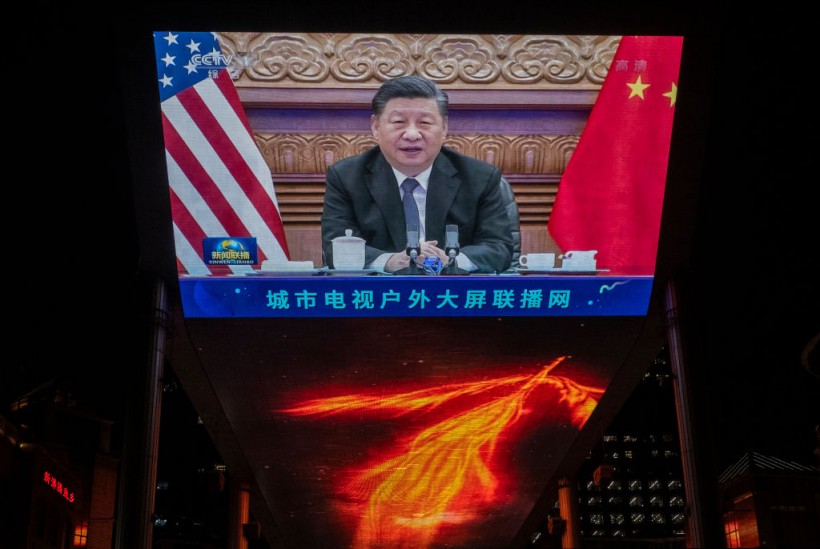
(Photo : Photo by Kevin Frayer/Getty Images)
BEIJING, CHINA - NOVEMBER 16: A large screen displays China's President Xi Jinping during a virtual summit with United States President Joe Biden, not seen, during the evening CCTV news broadcast outside a shopping mall on November 16, 2021 in Beijing, China. The two leaders met for more than three hours and discussed trade, climate change, Taiwan and other issues in what was their longest meeting since Biden was elected last year.
Chinese President Xi Jinping made statements on Monday where he called on other countries to abandon what he called a "Cold War mentality," arguing that history has shown confrontation only ever invited disastrous consequences, and urged global cooperation.
The Asian leader's remarks came at a time when tensions between China and the United States have been deteriorating over the issue with Taiwan's sovereignty. Authorities also have growing fears that Russia could aggressively march into Ukraine.
Xi's Global Address
Xi's speech was made via videoconference at The Davos Agenda virtual event where he said that the world needed to "discard" the mentality and aim for peaceful co-existence and "win-win outcomes." The Chinese president said the world was currently filled with chaos and destruction and hatred.
"History has proved time and again that confrontation does not solve problems. It only invites catastrophic consequences. Protectionism and unilateralism can protect no one. They ultimately hurt the interests of others as well as one's own. Even worse are the practices of hegemony and bullying, which run counter to the tide of history," said Xi based on a translation, CNBC reported.
As Xi was making his urge to other global leaders on Monday, he also called on officials to cooperate against the coronavirus pandemic. The Chinese president also pledged to send out an additional one billion doses to other nations to help with the vaccination of their residents.
The Chinese president touted his nation's efforts to share its coronavirus vaccines, fight climate change, and promote development at home and abroad. Xi also delivered the opening speech of the virtual gathering hosted by the World Economic Forum.
The online event where Xi spoke was held virtually in place of its annual January meeting in Davos, Switzerland, because of the rising threat of the coronavirus due to the Omicron variant. The Chinese president also addressed standard themes from his previous comments to international audiences, which include complaints by China's trading partners, Fox News reported.
Coronavirus Pandemic
Moderna's CEO said that the company was already working on a single-shot booster for both COVID-19 and the flu. The announcement, which was made in a panel session on the virus, comes as the top infectious disease expert in the United States, Dr. Anthony Fauci, said that it was "very disturbing" there were still many people who were hesitant to get vaccinated.
Chinese President Xi, who has not traveled outside of his country since the beginning of the coronavirus pandemic in early 2020, touted his nation's efforts that have distributed more than two billion doses of the coronavirus vaccine to more than 120 countries and international institutions.
The Asian leader announced plans to donate 600 million coronavirus doses to Africa and 150 million to Southeast Asia. On the other hand, managers of the UN-backed COVAX program that aims to distribute vaccines to developing countries said over the weekend that it has now successfully shipped out one billion coronavirus vaccine doses.
"A zero-sum approach that enlarges one's own gain at the expense of others will not help. The right way forward for humanity is peaceful development and win-win cooperation," said Xi, the Associated Press reported.
Related Article: Experts Warn for More COVID-19 Variants; Current Vaccines May Not Be Effective Against Upcoming Strains








